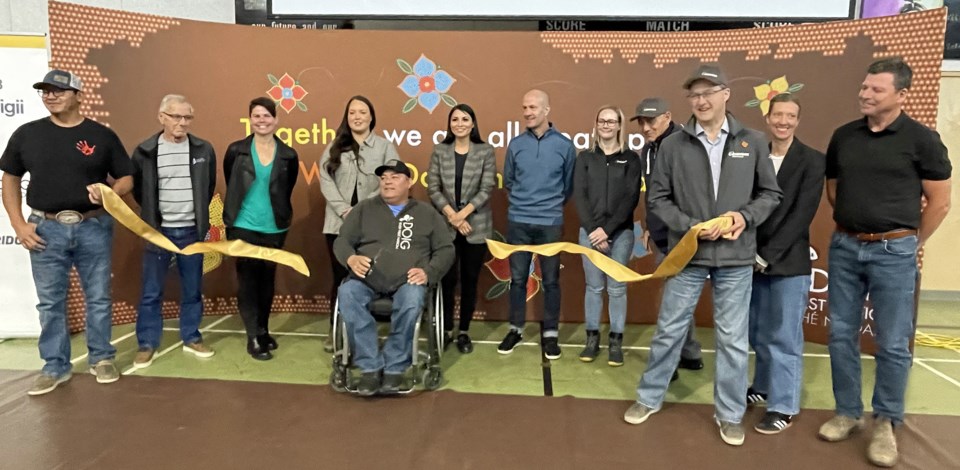Enbridge, the Calgary-based pipeline and energy giant, has officially announced that it has named a key component of its proposed Aspen Point Program natural gas pipeline system in honour of the Doig River First Nation people, whose territory the pipeline will cross.
At a ribbon-cutting ceremony Tuesday at Enbridge’s Compressor Station 1B, located five kilometres south of Taylor, a crowd of about 75 gathered to hear that the company will now refer to the station as Wǫchiigii, the Dane-zaa Záágéʔ Beaver language name that translates to Peace River in English.
“We are proud to carry the first Dane-zaa name along our natural gas pipeline system in B.C.,” said Steve Elliott, Enbridge’s vice-president of Canadian gas transmission and midstream, in a media release. “This name not only honours the traditional land and cultural heritage of Indigenous people but also represents our ongoing effort to build stronger relationships with Doig River First Nation and other Indigenous groups across the province.
“While we’ve had a longstanding history of working with Doig River First Nation, we firmly believe that meaningful engagement goes beyond just naming—it involves ongoing open dialogue and collaboration. That’s what this name means for us: it’s a demonstration and commitment to continued partnership.”
The name Wǫchiigii was chosen by the Doig River First Nation as a result of discussions with Enbridge about the proposed natural gas expansion project in northern B.C.
“The Dane-zaa people have lived along the Peace River for more than 12,000 years, which they referred to as Wǫchiigii (Peace River),” said Doig River First Nation Chief Trevor Makadahay. “Among the rivers and valleys, the Beaver people were able to find harmony in nature, establish good governance, and maintain peaceful coexistence with neighbours and newcomers alike.”
Members of the Doig River First Nation council and administration, community members, Enbridge representatives, and leaders of nearby municipalities attended the ceremony.
According to Enbridge, the name “reflects a broader shift in how industry and government are approaching reconciliation with Indigenous communities. Across B.C., there is increasing recognition of the importance of Indigenous collaboration and partnership. Enbridge, guided by its Indigenous Reconciliation Action Plan, is committed to taking action on ways to build stronger relationships with Indigenous communities and exploring opportunities to maximize economic inclusion and benefits.”
“For the past two years, we have worked with Indigenous nations and local communities in northern B.C. in the planning and development of this project,” said Dave Challoner, Enbridge manager of projects and Aspen Point Program project lead. “We look forward to continuing that work throughout its construction and ongoing operation.”
The project is currently under regulatory review. If approved, construction is expected to start in the first quarter of 2025, with a target completion date in the fourth quarter of 2026.
Natural gas produced in B.C. is needed to heat homes, businesses, hospitals, and schools, and to generate hydroelectric power. It is also the primary energy source for manufacturing plants across the province.
The $1.2 billion Aspen Point Program project will add 535 million cubic feet per day to the company's transmission capacity.


